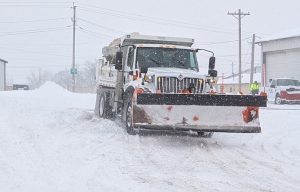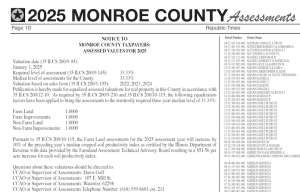Pantries brace for SNAP shutdown
An abrupt end to SNAP benefits amid the federal government shutdown has sparked concerns for food-insecure households throughout the country, with food pantries nationally and locally preparing to shoulder as much of the problem as they can.
Per an Oct. 20 Capitol News Illinois article by Ben Szalinski, the U.S. Department of Agriculture recently announced that Supplemental Nutrition Assistance Program benefits will not be funded as of Nov. 1 if the government shutdown moves into a second month.
Nationally, upwards of 40 million citizens receive SNAP benefits monthly. In Illinois, that figure stands at roughly 1.9 million and, as previously reported, 5,251 individuals received SNAP assistance from the Randolph County SNAP office – which also serves Monroe County – as of May.
The Capitol News Illinois article further notes the federal government has had no budget since the start of October, with shutdown negotiations at a standstill largely due to disagreements over health care.
Illinois, via federal funding, administers $350 million in SNAP benefits each month, with 45 percent of SNAP-receiving households in the state including children and 44 percent including someone with a disability.
The article further quotes Illinois Gov. JB Pritzker, who noted his state is largely unable to cover SNAP as the program is entirely funded by the federal government.
“There is no reimbursement of the state if those SNAP benefits are lost,” Pritzker said. “I asked that question immediately. There obviously is a big challenge for a lot of families — hundreds of thousands of families — across Illinois.”
As previously reported, a number of changes to SNAP benefits were already in the works as a result of President Trump’s “One Big, Beautiful Bill Act” signed on July 4.
Specifically, new work requirements for the program are set to go into effect late next year, with individuals aged 18-64 – previously 18-54 – as well as homeless individuals, veterans and young adults leaving foster care required to work at least 80 hours of paid, unpaid or volunteer work each month to qualify.
It’s estimated 360,000 individuals in the state could lose SNAP eligibility as a result of this change.
Further, states will be required to pay a portion of SNAP benefits starting in late 2027 based on their error rate of payments.
As over 1.8 million individuals in the state received about $4.7 billion in SNAP benefits in fiscal year 2025, the state could have to pay about $705 million.
Also pertinent to SNAP and food pantry discussion are additional Trump Administration funding cuts to two USDA programs, namely the Local Food Purchase Assistance Program and Resilient Food Systems Infrastructure Program.
These cuts took place earlier this year, with a March 4 press release from illinois.gov offering further context for the programs.
The LFPA program used federal funds to buy food from producers at fair market value and distribute that food to communities in need via food pantries at no cost. In Illinois, 883 community sites were able to distribute food from 176 farmers as a result of the program.
The RFSI program provided grants to small and mid-sized agricultural producers to strengthen the middle of the food supply chain, that grant money meant to be put toward projects that facilitate or expand production and distribution.
An Oct. 3 article from ProPublica details further Trump Administration cuts which have come to affect food pantries – specifically a $500 million cut to deliveries as part of the Emergency Food Assistance Program which amounted to roughly 94 million pounds of food.
This article goes on to note how the first Trump Administration in 2018 added funds to the program which was established in 1983, that addition meant to help farms struggling under retaliatory tariffs prompted by trade disputes.
While that additional federal funding helped as food banks were able to acquire nearly twice the money just from the fund as they received from the typical five-year congressional allocation, the current Trump Administration identified this funding as a “Biden-era slush fund,” cutting $500 million that was already allocated, resulting in waves of canceled deliveries.
In Monroe County, local food pantries are anticipating a wave of new clients as well as further requests for support from current clients as the break in SNAP benefits looms.
Becky Wilson, food pantry director with HOPE Christian Church Pantry, oversees one of the largest food pantries in this area. She spoke about how filling the facility’s shelves has already been difficult recently.
“This started way before the government shutdown,” Wilson said. “We’re just not getting the food we normally get. Everybody and anybody that I can get, I have them come down and look at our supplies, our stock room and stuff. The shelves are getting bare.”
She commented that the impact from a SNAP shutdown is difficult to gauge, noting many folks who stop by the pantry each Friday already receive SNAP benefits.
Wilson further stressed how she’s been making plans to increase her pantry’s stock all year, remarking that 800 cans of food can fly off the shelves as folks come by each week.
The pantry, as she said, typically serves around 200 people – even more in recent months – from throughout Monroe County and beyond, with some folks coming from Randolph County and elsewhere for support.
Wilson discussed the support this pantry receives with food coming from the St. Louis Area Food Bank and Operation Food Search as well as local Boy Scouts with their annual “Scouting for Food” drive and other individuals and groups in the community.
“The church comes through, and a lot of other churches have food drives for us,” Wilson said. “I might have to switch gears, because I’ve never reached out to the community like that, but this year I might have to reach out to the community, reach out to other churches.”
House of Neighborly Service Executive Director Natalie Kawalec also spoke about her organization’s expectations for the near future, noting how the holiday season is an especially difficult time for the funding to end.
“It’s already a hard time of the year anyways with holidays coming up, and this is just going to put that much added stress onto our families,” Kawalec said.
Kawalec said HNS is expecting further requests of all kinds of support from their clients, with those who already relied on SNAP likely seeking additional financial assistance as money previously used for bills is now forced to go to groceries as well.
“I do see that number probably doubling because I think a lot of people that might not necessarily need financial assistance, they’re going to need food, and they’ll start coming in for that,” Kawalec said.
Charles Myers with Concord Presbyterian Church Food Pantry in Waterloo shared his concerns for the pending halt to SNAP funding but also noted how locals have been traditionally supportive of pantries in the area.
“This community has supported all the local food pantries extremely well,” Myers said. “We’ve got a number of groups that are planning on food drives at least November and December.”
Sarah Giglotto with the Waterloo Senior Center and Western Egyptian Food Pantry simply emphasized that the pantry is available to help folks as needed.
“We are more than willing to help anybody that needs any assistance with food,” Giglotto said. “We also could use some donations, so if there’s anyone out there willing to help with food donations, we could use that as well.”
Per a post on the Waterloo Senior Center’s Facebook page, a number of non-canned good grocery items have been requested, including eggs, butter and toiletries.
For those seeking assistance from local food pantries, Concord Presbyterian at 338 Covington Drive in Waterloo is open Thursdays from 10 a.m. to 12:30 p.m., the HOPE Christian Church pantry at 9273 Coach Stop Road in Columbia is open every Friday from 9:30 a.m. to noon and the Western Egyptian Food Pantry at 207 West 4th Street in Waterloo is open every Tuesday from 11 a.m. to 2 p.m.
On Tuesday, Illinois Attorney General Kwame Raoul joined a coalition of 26 attorneys general and governors in filing a lawsuit against the U.S. Department of Agriculture and its Secretary Brooke Rollins for “unlawfully” suspending SNAP benefits.
“At a time of increased costs for families, the Trump Administration is making a deliberate, illegal and cruel decision to cut off access to food for nearly 2 million Illinoisans,” Raoul said. “I will continue to stand with other attorneys general against the president’s unlawful actions that threaten the separation of powers and the rule of law.”






